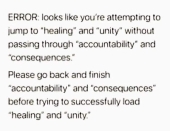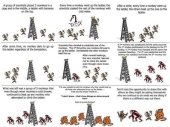
 5
5




Rufus Laggren wrote: On reading through this thread, it appears that two words are being used, w/out turn signals sorta speak, for 5 different concepts and situations. Maybe that should be one word.
r ranson wrote: In English, the action is related to the person. "He spilt the milk". Whereas in other languages, it's more common to say "the milk spilt" or "the milk spilt itself"
Gardens in my mind never need water
Castles in the air never have a wet basement
Well made buildings are fractal -- equally intelligent design at every level of detail.
Bright sparks remind others that they too can dance
What I am looking for is looking for me too!

 7
7




Come join me at www.peacockorchard.com

 1
1




I think you are quite right, the blame thing is part of the culture. It is kind of like in present day China (the last place where English is unlikely to become dominant any time soon) where you can be rewarded for turning someone else in, or accusing someone. That's the extreme version of it, but it exists in our culture too. I'm sure that that has been present in other cultures on the planet at other times... East Germany comes to mind in relatively recent years... Not English, but English has a Germanic base!-ha, maybe it's a german thing... the Nazi's were German, Right? But then Stalinist Russia comes to mind. It is generally a dictator's thing... methinks. A warlord thing. A thing based, as mentioned, on conquest, on dominance. By taking this way of communicating, we gain some reward, however sick and twisted it is, by putting the blame on someone else, or something else, but not accepting the blame or responisibility ourselves, by getting the eyes off of us. I think there is something deeply inherent in this culture that brings that out of us, and we hold onto this part of ourselves as somehow important, however small and on many levels. By placing blame, we make someone own it, but not us. It's a cruel world in this way, and we do need to consider it, and we do need to act better based on better thinking, deeper thinking, so that this can be removed in any form that seems like it's going to be harmful in our interpersonal relationship and to us as a society.We seem to be conditioned as a society to 1) feel that everything bad must be blamed on a person and 2) get scared that that blame will fall on us so we need to be aggressive before this happens in hopes this will deflect the blame.
"Never doubt that a small group of thoughtful, committed citizens can change the world; indeed, it's the only thing that ever has."-Margaret Mead "The only thing worse than being blind, is having sight but no vision."-Helen Keller










 1
1




"Never doubt that a small group of thoughtful, committed citizens can change the world; indeed, it's the only thing that ever has."-Margaret Mead "The only thing worse than being blind, is having sight but no vision."-Helen Keller










 2
2




"Never doubt that a small group of thoughtful, committed citizens can change the world; indeed, it's the only thing that ever has."-Margaret Mead "The only thing worse than being blind, is having sight but no vision."-Helen Keller




 2
2








Jan White wrote:
Are there really that many people who when hearing, "Hey, can we try putting the milk in this other spot? It keeps tipping over when we put it here." will get defensive about being blamed? I guess I understand that some people might feel blamed if someone says, "hey, you keep spilling the milk when you open the fridge." A simple tweak in wording like above would be enough for almost everyone, I would think. Maybe I don't get it.
Still able to dream.

 2
2











 6
6




I want to be 15 again …so I can ruin my life differently.
 2
2




r ranson wrote:What I was hoping we could talk about is how NOT to assign blame.
Not when or how to assign blame.
He was driving the tractor where he shouldn't - assigns blame.
It was intentional that they threw the milk - assigns blame.
Things happen and it is possible that these things are no one's fault.
And even if it is someone's fault, what good does blame do? It focuses on the past and gets the other person defensive.
Instead, how do we move forward and find solutions to make the future better?
The fridge was designed by someone who probably has never seen milk come in glass bottles. That's not their fault. That's not my fault for buying glass bottle milk. It's not the fault of the dairy for selling glass bottle milk.
There are only two places in the fridge tall enough for milk to sit. They are both in the door of the fridge. One is on the outer edge and the other closer to the hinge. The outer edge is more convenient so that's where the milk got put. This is no one's fault. It seemed like the right thing to do at the time, and I can't imagine anyone with this fridge doing differently.
Except, centrifugal force (again, no one's fault) means that if the milk is on the outer edge of the door, it's top-heavy and will try to fly out of the fridge upon opening. It's no one's fault. Even slowly opening the door pushes things against the milk to make it try to come out.
What we need to do is to put the milk in the other place so it won't fall out upon opening the door. How to communicate with someone that needs there to be blame for every single thing... it's too difficult. All they hear is "you are bad because you spilt the milk" When what I'm saying is "where we put the milk isn't working, let's put it in the other place"
 4
4





 2
2




Tereza Okava wrote:When it's a question of bottom line, blame gets more important.
 3
3











 3
3




Our inability to change everything should not stop us from changing what we can.
 5
5















Thank you in advance to everyone for their replies, help, and suggestions! Forgive me if I miss any replies, I'm still learning how to keep up with threads I participate in!
 2
2















"We're all just walking each other home." -Ram Dass
"Be a lamp, or a lifeboat, or a ladder."-Rumi
"It's all one song!" -Neil Young




r ranson wrote:To know the intent or attitude of another human would be an amazing thing.
I have only the words they share to offer insight into their intent. The way they phrase these words and the actions that follow (putting the milk back in the same place instead of troubleshooting the problem) gives insight into the attitude they approach the problem with.
Is the intent to make it so the milk doesn't spill? Then blame is the least effective way to get that result.
Thank you in advance to everyone for their replies, help, and suggestions! Forgive me if I miss any replies, I'm still learning how to keep up with threads I participate in!
 1
1




Judith Browning wrote:Emmett Ray, can I ask what 'Karen-ness' means please?
Thank you in advance to everyone for their replies, help, and suggestions! Forgive me if I miss any replies, I'm still learning how to keep up with threads I participate in!
 5
5












| I agree. Here's the link: http://stoves2.com |







